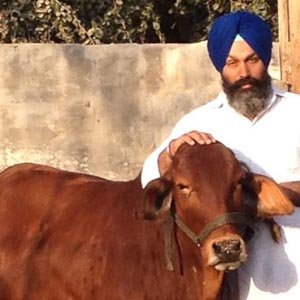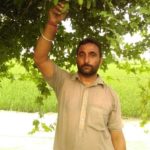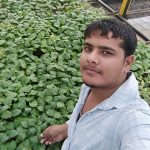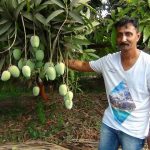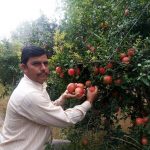Navdeep Singh Virk’s Journey: From 10 Black and White Holstein Friesian (HF) Cows to a Successful Dairy Farm of Red and White HF Cows
Introduction
In the heart of Punjab’s Patiala district, in a village named Shergarh, a story of determination, innovation, and dedication unfolds. Navdeep Singh Virk, a passionate farmer, embarked on his journey in 2012 with just ten cows. Over the years, he has not only transformed his small dairy farm into a thriving enterprise but has also become a pioneer in promoting the European breed of Red and White Holstein Friesian (HF) cows in India. Navdeep’s success emphasizes the importance of genetic diversity, immunity, and high milk production.
The Beginning
Navdeep Singh Virk’s journey began with a modest herd of ten black and white Holstein Friesian cows. His vision was clear – to provide the best care for his cows and to continually improve their breed. To achieve this, he made the bold decision to import semen from Europe, specifically of the Red and white Holstein Friesian, which are known for their superior milk production and resilience. These Red and white Holstein Friesian breeds are distinct from the conventional A1/A2 milk cows, offering unique advantages. These cows have different names in different countries. These are known as Ayrshire in Scotland, Dutch in Pakistan, and Red and White HF in India.
Advantages of Red and White Holstein Breeds
One of the primary advantages of Red and white Holstein breeds, as Navdeep discovered, lies in their robust immunity. These cows are inherently less susceptible to diseases, making them a valuable asset for any dairy farmer. Moreover, they can endure harsh weather conditions, including temperatures as high as 50 degrees Celsius, without the need for additional cooling systems like foggers.
Navdeep’s herd now consists of 22 animals, including two bulls. Semen shortage, which is a common challenge for dairy farmers, is effectively managed by Navdeep through the use of his own produced bulls. After three years, a bull becomes capable of serving as a breeding sire. This not only ensures a sustainable source of semen but also allows Navdeep to sell high-quality bulls at better rates than cows. He has sold one bull, two milking cows and one heifer to the Animal Husbandry Department, Sikkim.
Expanding Horizons
Navdeep Singh Virk’s dedication to his farm extends beyond the borders of Punjab. He supplies semen to farmers in Punjab, Haryana, Uttar Pradesh, Rajasthan, and Bihar. His reputation for quality semen has even caught the attention of semen banks, who source semen from his farm. Navdeep’s commitment to breeding excellence has created a ripple effect in the dairy farming community.
Genetics and Milk Production
Navdeep firmly believes that milk production is heavily influenced by genetics. Consequently, he does not purchase cows from outside sources. Instead, he relies on careful breeding to maintain and improve the genetic quality of his herd. The result is a remarkable range of milk production, spanning from 7,000 to 13,000 liters per cow.
Navdeep’s dedication to genetic diversity also extends to preventing inbreeding. He maintains meticulous records to ensure that no inbreeding occurs within his farm, preserving the health and vitality of his cows.
Nutrition and Diet
To maximize milk production, Navdeep employs the services of a nutritionist who formulates balanced diets for his cows. On average, his cows produce 35 liters of milk per day, with some reaching an impressive 45 liters. The nutritionist takes into account factors like body weight and milk production to tailor diets to each cow’s specific needs.
Sustainable Practices
Navdeep’s commitment to sustainability is evident in every aspect of his farm. From the careful selection of Red and White HF breeds to the precise diets provided to his cows, he places a strong emphasis on environmental responsibility. He also practices silage preparation with a focus on starch, green foliage, and protein content to ensure his cows receive the best nutrition.
Water and Comfort
Navdeep’s farm goes beyond just meeting the basic needs of his animals. He has set up tanks, bowls, and pools where fresh water is added daily. Cows have the freedom to spend time in the pool, which not only cools their bodies but also keeps their udders clean. This attention to the comfort of his animals is proof of Navdeep’s commitment to their well-being.
A Message to Farmers
Share Knowledge: Navdeep’s vision includes educating others about the benefits of these breeds.
Conclusion
Navdeep Singh Virk’s remarkable journey from a small dairy farm to a thriving enterprise shows his excellence in dairy farming. His story is an inspiration to farmers everywhere, offering valuable insights into the benefits of genetic diversity, immunity, and high milk production. Navdeep’s vision for the future includes expanding his farm’s capacity and further promoting the advantages of Red and White HF breeds. His message to fellow farmers is clear: adapt to changing conditions, focus on sustainability, and invest wisely for a prosperous future in dairy farming.



